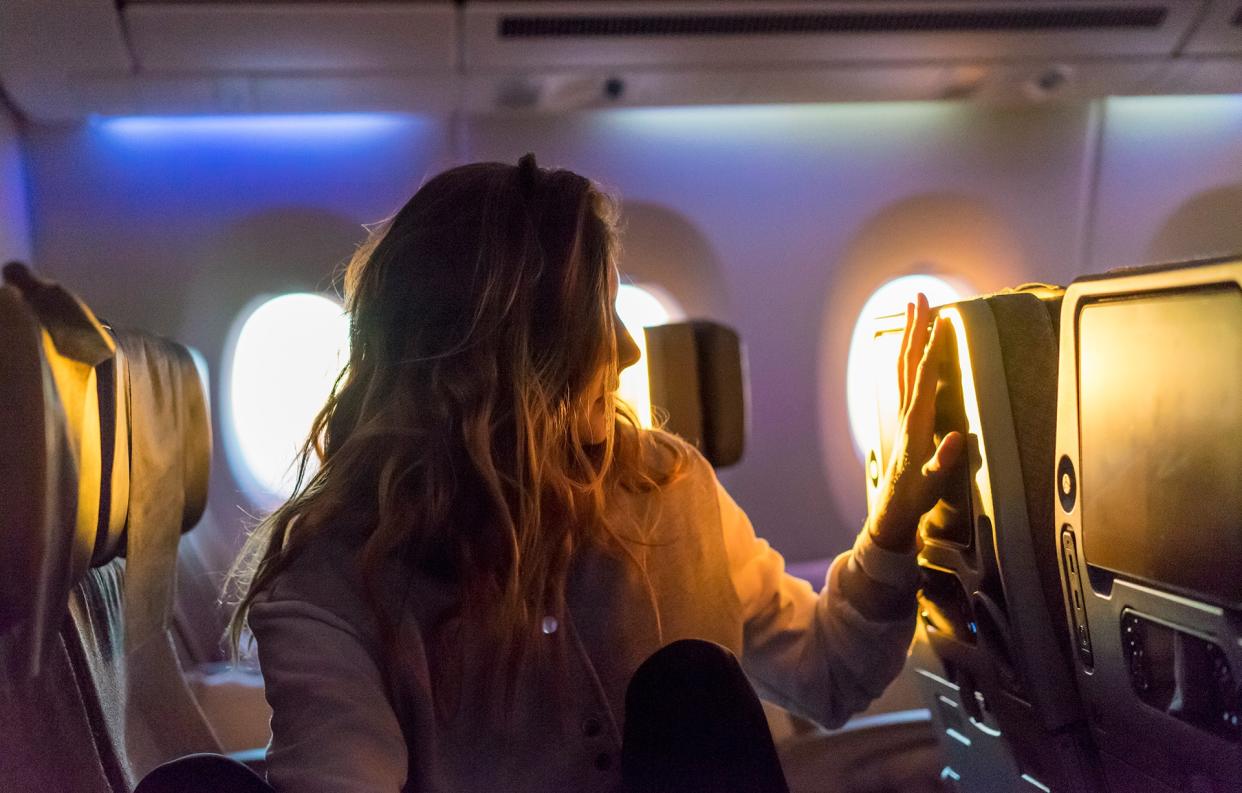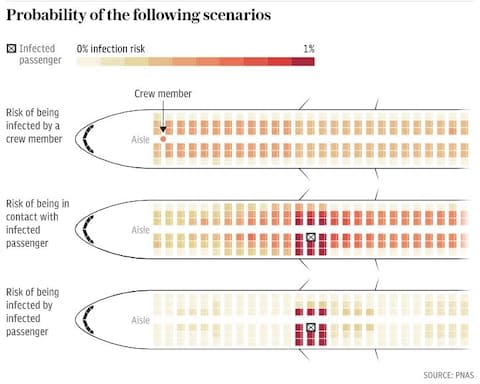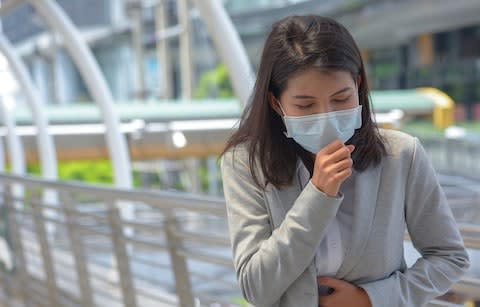How flying can make you ill - and 4 ways you can avoid catching a bug

It’s a holiday tale as old as time. A longed-for break is planned, security queues navigated, you even manage to squeak past a surprise cabin baggage weight check - then you land in sunny Spain with the sniffles.
It seems nearly everyone has had an experience with a fellow passenger coughing their way through the black death. But is cabin air really that germ-ridden?
A previous study in the Journal of Environmental Health Research found that colds may be 113 times more likely to be transmitted on a plane than during normal daily life on the ground, while in 2014, Auburn University in Alabama revealed that disease-causing bacteria can survive for up to a week inside plane cabins.
Staphylococcus aureus (MRSA), a bacteria that could cause infections, skin disease, pneumonia and sepsis, lived the longest (168 hours); Escherichia coli (E. coli), which can cause urinary tract infections, respiratory illnesses and diarrhoea, was found to survive for 96 hours.
Seat pockets, tray tables, window shades and armrests were all shown to be havens for lurking bacteria, with a 2015 study finding that seatback trays are 8 times dirtier than plane bathrooms.
The dirtiest places on your flight:
Seatbelt buckles
Overhead air vents
Toilet flush buttons
Tray table
On-board water

Bugs on a plane
You’re not just being attacked by other travellers smearing germs all over the arm rests ; scientists have modelled the way bugs are spread on flights, cabin crew also being offenders.
In 2018, researchers at Emory University in the United States analysed passenger and crew movements to model the likelihood of passengers catching a respiratory infection during a flight.
The study showed that an infected air steward is a greater risk to those sitting in aisle or middle seats than those squeezed next to the window.
Perhaps most disconcertingly, if you are seated within a row or two seats of an infected passenger you have an 80 per cent chance of catching a bug - no matter the type of seat you are in.
The good news? Once you're out of the two-seat-or-less danger zone, the odds of you catching anything drops to only 3 per cent.

Watch out for dirty hands and dry air
Dr Richard Dawood, Telegraph Travel's travel health expert, suggests that you're just as likely to come into contact with germs on the way to the airport.
"For most people, a journey affords a host of other opportunities to acquire infection: in the taxi to the airport, on buses and trains, in crowded departure lounges, and plenty of close contact with people at your destination," he advised a reader who developed an illness after a long-haul flight. "Those in-flight snacks should be avoided until you have had a chance to wash your hands.”
While surfaces blanketed with germs are easy enough to avoid thanks to portable antiseptic wipes and the evergreen solution of keeping your hands to yourself, airborne diseases aren’t as easily scuppered.
According to Dr Dawood, “virtually moisture-free” conditions inside a plane cabin mean you’re extra vulnerable to airborne infection. Respiratory infection and viruses are all known to thrive in conditions of low-humidity, which includes everything from the common cold to far worse.
“Coughing passengers can spread infection to those immediately around them, and in a small number of cases more severe illnesses - such as TB [tuberculosis] - are known to have spread in this way,” says Dr Dawood.

The biggest culprit
Perhaps the biggest health risk on a plane is when a flight is delayed and ventilation systems are turned off.
“Some of the best-known instances have occurred on the ground - such as a large flu outbreak following a prolonged delay on the ground - with ventilation systems switched off,” says Dr Dawood.
A 1979 study was done on an aircraft that was held on the ground for three hours, with the engine and ventilation system turned off. Within 72 hours, 72 per cent of the 54 passengers on-board displayed cold and flu symptoms including a cough, fever, sore throat and headache.
If you end up grounded due to delays, it may be worth having a face mask handy - though you’ll be better off offering it to other passengers.
“The ideal thing to do would be to get the person who’s ill to wear a face mask,” advises Dr Dawood. “You could escalate it to captain level and say, here’s a person who’s a danger to other passengers and they should wear a face mask. However, you could end up with a pretty nasty incident if someone digs in their heels.”

It’s not all about going viral
There way be more to worry about in your cabin air than viruses.
Two scientific studies published in the World Health Organization's journal, Public Health Panorama, in 2017 found that cabin air was often polluted with engine oil and other aircraft fluids. These pollutants can cause significant health problems for pilots, crew members and possibly even some frequent passengers.
According to the study, the air we breathe on commercial airplanes is a blend of “recycled air” within the cabin (that we all inhale and exhale) and outside or "bleed" air that is pushed through the aircraft's engines.
Leaks of engine oil, hydraulic fluid, or even deicing fluid, can end up find their way into the cabin via this outside air. The industry term for these kinds of mishaps? The misleadingly jolly-sounding, "fume events."
Researchers from three universities (two in the United Kingdom and one in Australia), tracked health issue reports among flight crew, passengers and crew members alongside potential fume events and found a, “clear link between being exposed to air supplies contaminated by engine oil and other aircraft fluids, and a variety of health problems.”
So if you’ve experienced anything from dizziness to breathing and vision problems on a flight, congratulations - you might have attended a fume event.
The fight to breathe easy
A number of airlines have faced lawsuits over claims of ‘toxic’ cabin air including, this year, five of the UK’s largest airlines: British Airways, EasyJet, Thomas Cook, Jet2 and Virgin Atlantic.
Fifty-one cases have been brought against these flying giants by union Unite. The British and Irish trade union has also called for a public inquiry, hoping to pressure the airline industry into cleaning up their cabin air.
Possible solutions could include using different oils to lubricate jet engines, installing air filters, better monitoring of cabin air and manufacturing planes that bring compressed air straight from the atmosphere.
Alternatively, anxious fliers can try to snag a spot on a Boeing 787, one of the only aircrafts to not use the bleed air system to provide cabin ventilation. As aircraft technology advances, hopes are high that more models will incorporate this.
Staying healthy in the sky
Still worried about those pesky cabin germs? Dr Dawood offers the following tips to stay as healthy as possible on board
Travel with alcohol hand gel, or antibacterial hand wipes, and use them before eating or handling food, and after going to the toilet (in addition to washing your hands).
Use a nasal saline spray, or a product such as Vicks First Defence, to keep the nasal passages moist during a long flight, reducing the risk of airborne disease transmission.
Consider the source of any food or water you are offered on board very carefully. On flights originating from places with poor hygiene, stick to bottled water and don’t eat food unless you are convinced of its safety.
Stay hydrated. Immobility in a cramped seated position causes fluid shifts within the body, moving fluid out of circulation and into the tissues (evident for example as ankle swelling during lengthy flights). Most people should be drinking the equivalent of a litre of water during a six to eight hour flight in order to remain well hydrated, but most people drink much less during a flight than they would on the ground. Consequences include headache, fatigue, constipation, and in women, an increased risk of cystitis.
Inspiration for your inbox
Sign up to Telegraph Travel's new weekly newsletter for the latest features, advice, competitions, exclusive deals and comment.


